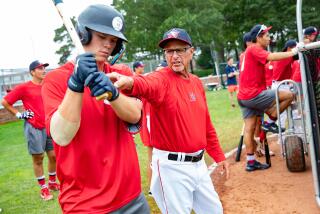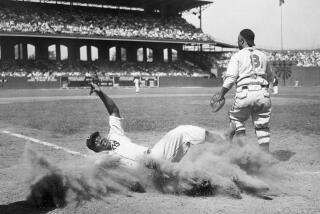Spawning Talent : Old Cape Cod, a Summer College League Where Players Love to Play, Parents Love to Visit, Baseball Scouts Love to Scout
- Share via
YARMOUTH, Mass. — It is another idyllic afternoon on old Cape Cod as Eileen Barr, 15 months, arrives at Red Wilson Field in a stroller pushed by her mother, Marianne, and sister, Katie, 4.
John Barr, scouting director of the New York Mets, is combining business with pleasure on this trip to the Cape Cod League, the most prestigious of the summer college leagues.
As Eileen sleeps peacefully in the shade of a pine tree behind home plate at the Yarmouth-Dennis High School diamond, Barr sets up lawn chairs and takes out a notebook and stopwatch as he prepares to watch the Yarmouth-Dennis Red Sox play the Chatham Athletics. He is surrounded by a dozen or more scouts from other organizations, all a long way from the big-city tempo and troubled times of the strike-threatened major leagues.
It is a throwback to another time and place, or as Barr said: “Players love playing here, parents love visiting here and scouts love scouting here.”
On this spit of land that has become a summer vacation retreat for the rich, famous and otherwise, from eclectic Provincetown on the Eastern tip to the popular restaurants and shops of Hyannis (home of the Kennedys) and continuing on to the dramatic seascapes of Woods Hole in the West, the Cape has also been a professional baseball breeding ground for more than 100 years.
In the recent major league All-Star game alone, there were nine players who had spent a summer or more in the Cape Cod League as amateurs--Frank Thomas, Will Clark, Jeff Bagwell, Chuck Knoblauch, Albert Belle, Mickey Tettleton, Craig Biggio, Darrin Fletcher and Jeff Conine.
There are more than 90 players currently in the majors who received their first extensive experience with a wood bat in Cape Cod. More than 50 players selected in the June draft, including three first-round choices, played in the Cape last summer.
The major leagues provide the 12-team league with $85,000 to cover bats, balls, umpires and scorers. Noted David Mulholland, general manager of the Orleans Cardinals: “For $85,000 a year, it’s a highly productive minor league sustem.”
Restricted to college-eligible players--23 to a team, by invitation only--this year’s rosters include players from 106 four-year and two-year schools.
Said Barr: “You may find a better individual player or two on the national team or in another collegiate (summer) league, but overall the Cape always has the best talent.”
Said Orrin Freeman, a national crosschecker with the Florida Marlins: “The Cape provides us with a chance to see the best college hitters going against the best college pitchers, and the best college pitchers going against the best college hitters. Very few players who do well with the wood bat here fail to do well with it in the pros.”
The Cape’s use of wood has forced several other summer leagues to go from aluminum to wood to stay competitive. The wood bat, of course, tends to be heavier than aluminum--the mandatory college bat--and slower through the strike zone. It is also less forgiving than aluminum. There are fewer handle hits, fewer rocket shots. The sweet spot on a wood bat is much smaller.
This year’s Cape players have been blessed with a new bat source. Tom Bednark, a fourth-generation woodworker who lives in nearby Centerville, has gone into the bat-making business under the name of Barnstable Bat Co. His high-quality models, produced in his garage workshop, have been a major hit in the Cape league, but he does not intend to threaten Louisville Slugger.
“I hope to sell a hundred a week, enough to make a comfortable living,” he said. “Louisville throws away more than I make.”
Bednark also has a long attachment to the league here. His grandfather came home one day and told Bednark’s grandmother that they were moving into the garage so that the entire Hyannis team could spend the summer in their nine-bedroom house.
Host families now house one or two players each. The respective clubs find 20- to 28-hour-a-week jobs for their players, and the players pay their host families $45 a week. Some families include meals for that, some don’t. This is the fifth year that Margie and Brian Homer of Yarmouth have acted as hosts to Red Sox players.
“I thought they would provide good role models for our own children,” Margie Homer said, “and they have. I haven’t met one that I haven’t liked. I mean, we did it for our kids in the beginning, and now we do it for ourselves. We just need to be wealthy, so I could go visit them after they move on. Almost all of them stay in touch.”
Three of the Homers’ former tenants are playing professionally. Two have invited them to their weddings this year. Not every experience--for player or host family--is positive, but every time the Homers, for example, think about not doing it anymore, they quickly decide otherwise.
“The only decision we’ve made after this year is no more pitchers,” she said.
The Homers are currently housing their third pitcher of the summer. The first two--Jason Dawsey of Clemson and replacement Travis Burgus of San Diego University--were both sent home with elbow problems.
Some believe that the league’s coaches sacrifice development for winning, but most of the coaches come from small colleges and need the summer income. Winning generally translates to rehiring, since each franchise that qualifies for the playoffs--two per division--figures to make $1,000 to $1,500 a game from playoff admissions.
Said John Castleberry, a Marlin scout who previously coached Orleans for nine years: “There’s a certain amount of development that takes place simply by a player going up against the best every day.”
The regular season runs from June 10 through Aug. 5. Teams generally play five games a week. The longest drive is 46 miles, from Chatham in the East to Wareham in the West. Attendance varies from a few hundred to a few thousand, with teams charging only a $1 donation for admission. A crowd of about 4,500 attended Saturday’s All-Star game at Orleans, where the grass along the first-base and right-field lines at Eldredge Park is terraced, making for a colorful scene of picnicking fans on blankets and lawn chairs.
Charles O’Connor, general counsel to the major league owners’ Player Relations Committee and owner of a vacation home within walking distance of the Orleans park, scanned the All-Star scene and said: “This is what baseball is supposed to look like.”
USC shortstop Gabe Alvarez, in his second summer with Chatham and expected to be a high draft choice next June, said he tries not to worry about how many scouts are watching.
“The competition is so good that I look on it as an opportunity to improve all my tools,” he said. “The main thing is, I’m here to enjoy myself.”
The league has several sponsors, but every club is responsible for paying part or all of each player’s travel costs from and to his home city. The gate does not cover budgets, so there are raffles, auctions, card shows, camps and clinics. Orleans takes in $30,000 by merchandising T-shirts, caps, etc. in 22 home dates.
Yarmouth-Dennis beefed up attendance recently by advertising that pitcher Jason Haynie of South Carolina, who does some juggling, magic and fire eating--stunts he learned with the Circus of the Kids in St. Petersburg, Fla., and which he has honed at various school shows and charity events--would be performing after the game. Haynie wowed a crowd of several hundred, including teammates, particularly with his fire eating.
“I can blow smoke on or off the mound,” he said with a wink, adding that he considers himself a performer on or off the mound. “It’s just a different kind of rush, a different kind of thrill.”
Curly Clement knows the feeling. He’s 75, in his 33rd year with the league, and still works a game or two a week behind the plate or on the bases as the league’s evaluator of umpires. “I’m God in this league,” he said with a smile. He’s also the Candy Man, keeping a pocketful of sweets with which to ease a manager or player’s sour reaction to a call.
“I don’t know when I’m going to hang it up,” Clement said after three hours behind the plate on a humid afternoon. “I still enjoy it. My wife said she’s going to wheel me out there if necessary, and she doesn’t even like baseball.”
On old Cape Cod, it’s hard not liking it.


